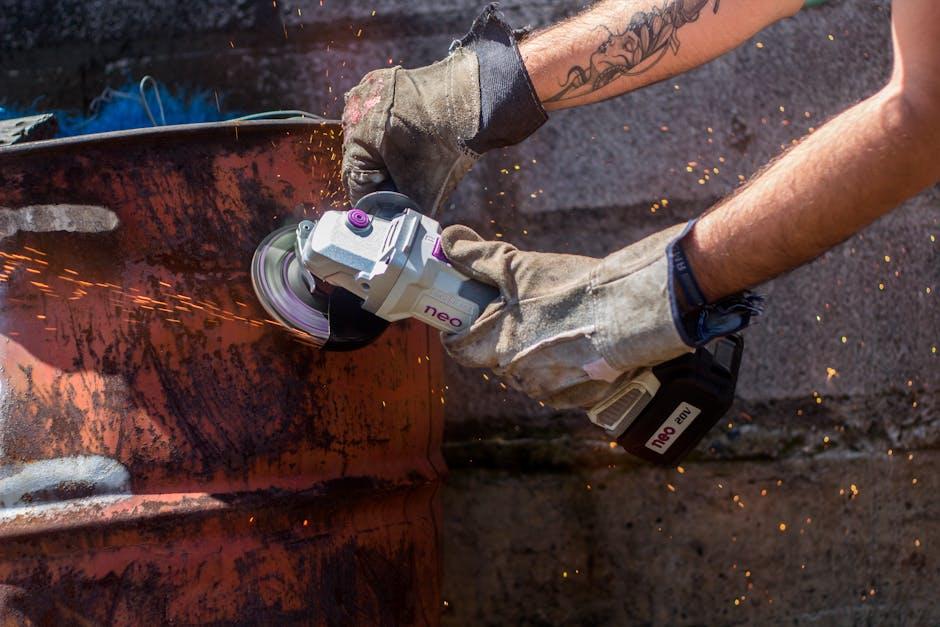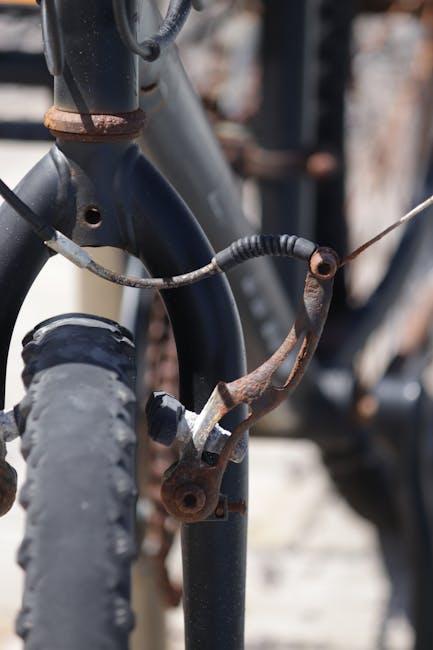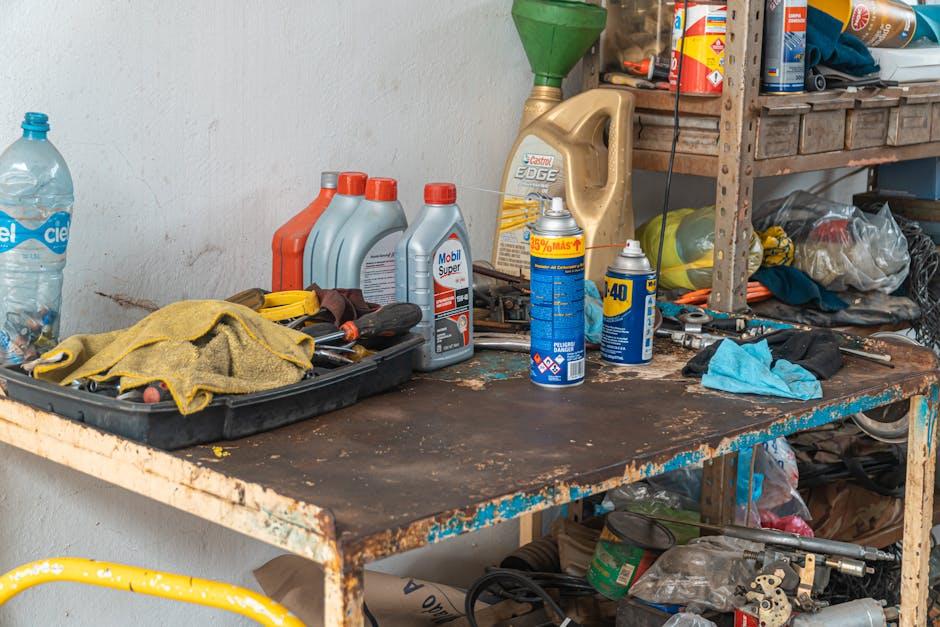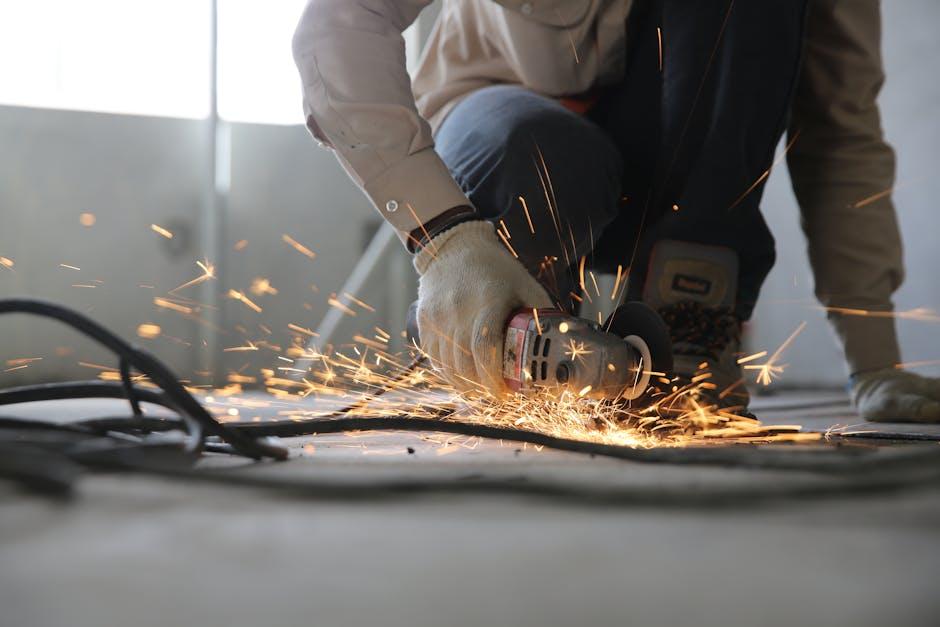There’s a sharp, unsettling sound echoing from beneath your wheels—a harsh, grinding noise that turns every stop into a jarring experience. Brakes grinding is a warning sign that something isn’t quite right, and while it might be easy to ignore the nuisance, understanding the cause is crucial for your safety and your vehicle’s longevity. In this article, we’ll explore the common reasons behind grinding brakes, what those sounds are trying to tell you, and when it’s time to seek professional help before a minor annoyance turns into a major repair.
Table of Contents
- Understanding the Root Causes of Brake Grinding
- Identifying Signs and Symptoms Before Damage Occurs
- The Role of Brake Pads and Rotors in Grinding Noises
- How Worn Components Impact Your Vehicle’s Safety
- Essential Steps to Diagnose Brake Noise Accurately
- Preventative Maintenance Tips to Avoid Brake Grinding
- Q&A
- The Conclusion

Understanding the Root Causes of Brake Grinding
When you hear that unsettling grinding noise as you apply the brakes, it’s more than just an annoyance—it’s a red flag indicating that something is amiss beneath the surface. One common culprit is worn brake pads. These pads have a finite lifespan, and once the friction material wears away, the metal backing plates make direct contact with the rotors, producing the harsh grinding sound. Another frequent cause is accumulation of debris or rust lodged between the brake pads and rotors, which disrupts smooth operation and triggers noise. Additionally, poorly lubricated caliper slides or seized components can also create resistance, leading to that familiar grinding.
- Thin or damaged brake pads: Metal-on-metal contact causing noise and damage
- Rotor issues: Warping or scored rotors increase vibrations and grinding
- Foreign particles: Dirt, rust, or small stones stuck in the braking system
- Faulty calipers: Sticking caliper pistons preventing pad retraction
| Root Cause | Common Symptom | Potential Impact |
|---|---|---|
| Worn Brake Pads | Loud metal grinding | Damage to rotors, costly repairs |
| Rotor Damage | Vibration during braking | Reduced stopping efficiency |
| Debris in Brake System | Intermittent grinding noise | Uneven pad wear |
| Caliper Malfunction | Brakes drag or grind | Accelerated pad and rotor wear |

Identifying Signs and Symptoms Before Damage Occurs
Before your car’s brakes start producing that unsettling grinding noise, there are subtle cues that warn you of underlying issues. These early indicators often surface in the form of changes in brake performance or sensations when you press the pedal. You might notice a slight vibration, a squeaking sound, or increased stopping distances. These signs should never be ignored, as they signal the gradual wear of critical components like brake pads or rotors. Catching these symptoms early not only prevents noise but also protects your vehicle from costly repairs down the line.
Common Early Warning Signs Include:
- Soft or spongy brake pedal feel
- Unusual squealing or chirping noises
- Increased braking distance
- Brake warning light illumination
| Symptom | Possible Cause | Recommended Action |
|---|---|---|
| Squeaking noise | Worn brake pads glazing | Inspect and replace brake pads |
| Vibration when braking | Warped rotors | Resurface or replace rotors |
| Soft brake pedal | Brake fluid leak or air in system | Check fluid and bleed brakes |

The Role of Brake Pads and Rotors in Grinding Noises
When your vehicle’s brakes start producing a grinding noise, it’s often a clear sign that something is amiss with the brake pads or rotors. Brake pads serve as the friction material that presses against the rotors to slow down or stop the vehicle. Over time, these pads wear down, and if they become completely worn out, the metal backing of the pads can come into direct contact with the rotors, causing a harsh, grinding sound. This metallic screech is not only irritating but also indicates that the braking system is dangerously compromised.
Similarly, the rotors themselves play a crucial role in braking efficiency and noise. When rotors become warped, scored, or excessively worn, they no longer provide a smooth surface for the pads to grip, often leading to vibrations and grinding noises. Here’s a quick look at how pad and rotor conditions impact grinding sounds:
| Component | Condition | Impact on Noise |
|---|---|---|
| Brake Pads | Worn down to metal backing | Loud, harsh grinding |
| Brake Pads | Glazed surface | Squeaking, possible grinding |
| Rotors | Warped or scored | Vibrations with grinding noise |
| Rotors | Rust buildup | Intermittent grinding upon initial brake application |
- Regular maintenance: Essential to prevent excessive pad wear and rotor damage.
- Immediate attention: Grinding noises are a warning—you should have the brakes inspected without delay.
- Replacement vs. resurfacing: Depending on damage severity, rotors can either be resurfaced or require full replacement alongside new pads.

How Worn Components Impact Your Vehicle’s Safety
When various components of your braking system begin to wear down, every element—from the brake pads to the rotors—can compromise your vehicle’s ability to stop efficiently. Worn brake pads can cause uneven pressure, resulting in decreased responsiveness and that unsettling grinding noise which signals metal-on-metal contact. Additionally, damaged rotors can cause vibrations or pulsations in the brake pedal, reducing your control and potentially leading to dangerous situations in emergency braking. Such deterioration doesn’t just affect stopping power; it also increases the risk of longer stopping distances and unpredictable vehicle behavior.
It’s essential to recognize that these failing parts don’t act in isolation; they affect the entire braking ecosystem. Here’s a quick look at key components and their impact on safety:
- Brake Pads: Reduced friction, increased noise, and damage to rotors.
- Rotors: Warping causes vibrations and uneven braking force.
- Calipers: Sticking or leaking can lead to brake drag or loss of hydraulic pressure.
- Brake Lines: Cracks or leaks reduce brake fluid pressure, leading to partial braking failure.
| Component | Safety Impact | Signs to Watch For |
|---|---|---|
| Brake Pads | Decreased stopping power | Grinding noise, longer brake distances |
| Rotors | Uneven braking, vibrations | Pulsating pedal, steering wander |
| Calipers | Brake drag or failure | Brake pedal feels soft |
| Brake Lines | Fluid leaks and pressure loss | Soft or sinking brake pedal |

Essential Steps to Diagnose Brake Noise Accurately
Begin by conducting a thorough visual inspection of your braking components. Look for signs of worn brake pads, glazing on the rotor surface, or any foreign objects lodged within the system. Often, simple clues like uneven pad wear or rust can point directly to the cause of that irritating grinding sound. Additionally, pay close attention to the condition of the brake rotors themselves; scoring or grooves indicate excessive wear that demands immediate attention. Remember, safety starts with knowledge, so don’t underestimate the power of a detailed look under your vehicle’s wheel well.
Next, take the vehicle for a test drive to pinpoint when the noise occurs. Is it during initial braking or only under heavy pressure? Does the sound change with speed or road conditions? Use an unhurried approach to replicate the conditions associated with the noise. Alongside this, make use of the following checklist to guide your assessment:
- Listen: Identify frequency and pitch variations.
- Feel: Note any vibrations through pedal or steering.
- Observe: Watch for unusual vehicle behavior when braking.
- Check: Verify brake fluid levels and condition.
| Symptom | Possible Cause | Recommended Action |
|---|---|---|
| High-pitched squeal | Worn brake pads | Replace brake pads immediately |
| Harsh grinding sound | Metal-on-metal contact | Inspect rotors and pads; likely rotor replacement needed |
| Intermittent grinding | Debris in caliper or rotor | Clean brake system thoroughly |

Preventative Maintenance Tips to Avoid Brake Grinding
Keeping your braking system in top shape is essential not only for safety but also to dodge those annoying grinding noises. One of the simplest ways to achieve this is by regularly inspecting your brake pads for wear and tear. Replacing them before they reach the metal backing can save you from costly rotor damage. Additionally, always ensure the brake components are clean and free from debris which can cause unwanted friction.
Consider these easy-to-follow maintenance tips:
- Check brake fluid levels every month, topping up with the right type when necessary.
- Listen carefully for any unusual sounds during braking; early detection is key.
- Schedule professional brake inspections at least once a year, or as recommended by your vehicle’s manufacturer.
- Drive smoothly and avoid harsh braking, which accelerates wear.
| Maintenance Task | Recommended Frequency | Benefit |
|---|---|---|
| Brake Pad Inspection | Every 10,000 miles | Prevents metal-on-metal grinding |
| Brake Fluid Check | Monthly | Ensures proper hydraulic performance |
| Professional Brake Service | Annually | Comprehensive system health check |
Q&A
Q: Why are my brakes making a grinding noise?
A: Grinding noises from your brakes usually indicate that the brake pads have worn down completely, causing metal-to-metal contact between the brake rotor and caliper. This not only creates an unpleasant sound but can also damage your braking system.
Q: Can worn brake pads really cause grinding?
A: Absolutely. Brake pads have a built-in wear indicator that can start to produce noise when the pads are almost gone. Once they wear down past a certain point, the metal backing plate grinds against the rotor, resulting in that characteristic grinding sound.
Q: Are there other reasons for brake grinding besides worn pads?
A: Yes. Brake grinding can also be caused by debris trapped between the rotor and pads, rust buildup on the rotors, or a stuck caliper that prevents the brake pads from retracting properly. Each scenario can produce grinding but may require different fixes.
Q: Is it safe to drive with grinding brakes?
A: It’s generally not safe. Grinding brakes compromise your ability to stop efficiently and can lead to more costly repairs. It’s best to have your brakes checked by a professional as soon as you hear grinding to avoid further damage and ensure your safety.
Q: How can I prevent my brakes from grinding?
A: Regular brake maintenance is key. This includes timely replacement of brake pads, keeping the brake system clean, and having your brakes inspected during routine vehicle service. Addressing brake issues early can prevent grinding noises and keep your braking system in prime condition.
Q: What should I expect when I take my car to the mechanic for grinding brakes?
A: The mechanic will likely inspect the brake pads, rotors, and calipers for wear and damage. They might replace the brake pads, resurface or replace rotors, and ensure the calipers are functioning correctly. After repairs, the mechanic will usually test the brakes to confirm the grinding is resolved.
Q: Can brake grinding damage other parts of my car?
A: Yes. Grinding metal parts can lead to rotor damage and even affect your wheel bearings if left unchecked. This not only impacts safety but can significantly increase repair costs if more components become damaged.
Q: How often should I check my brakes to avoid grinding?
A: It’s wise to have your brakes inspected at least once a year or every 12,000 miles, whichever comes first. However, if you notice noises, reduced braking performance, or changes in pedal feel, it’s best to get them checked immediately.
Q: Is brake grinding more common in certain driving conditions?
A: Yes. Frequent stop-and-go traffic, mountainous terrain with heavy braking, or driving through wet or dirty conditions can accelerate brake wear and increase the chance of grinding sounds due to debris or rust buildup.
Q: Can I fix grinding brakes myself?
A: If you have experience and the proper tools, you might replace brake pads yourself. However, diagnosing the exact cause of grinding and ensuring the entire braking system is safe and functional is often best left to professionals. Safety is paramount when it comes to brakes.
The Conclusion
In the end, those unsettling grinding sounds are more than just a minor annoyance—they’re your vehicle’s way of waving a red flag. Understanding why your brakes are grinding empowers you to take timely action, ensuring your safety and saving you from costlier repairs down the road. So, the next time your brakes sing that abrasive tune, listen closely—it might just be the warning you need to keep your journeys smooth and secure.

